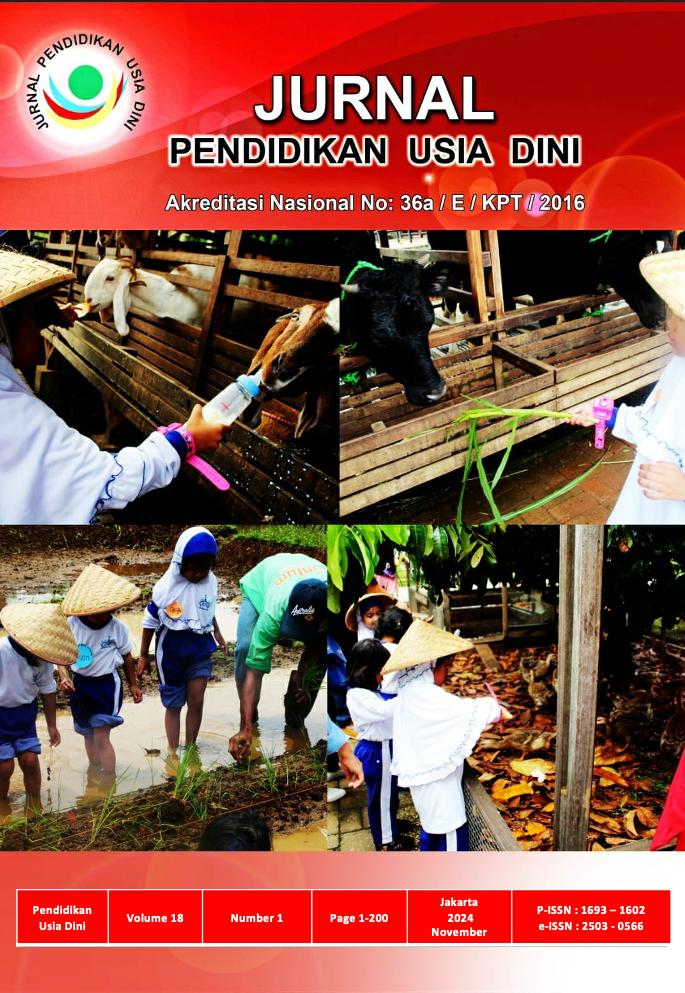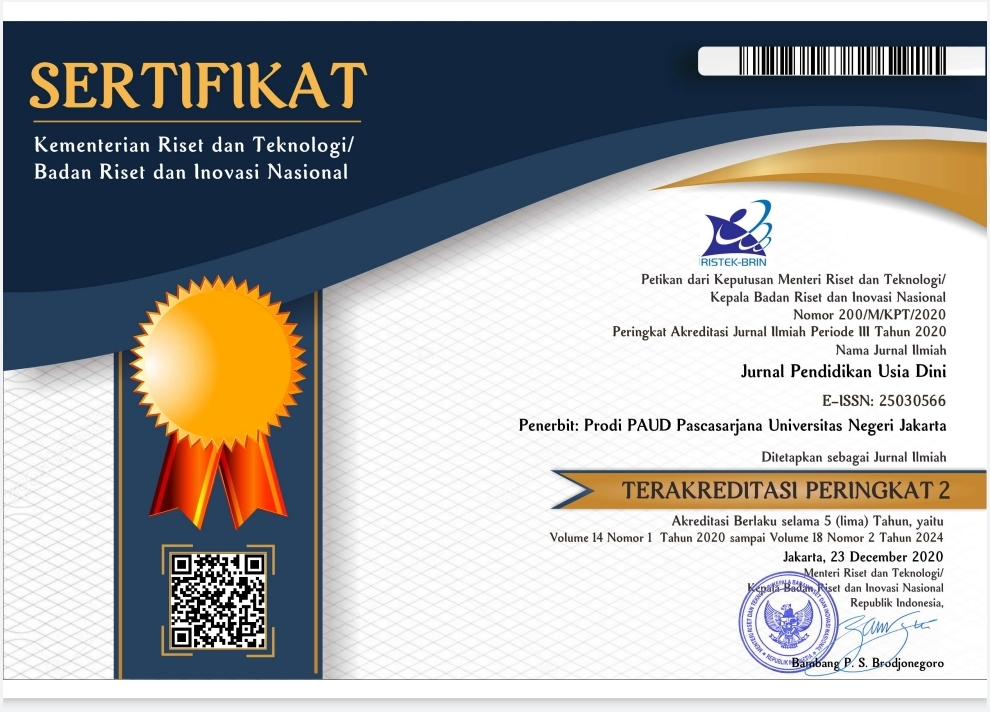Enhancing Early Childhood Educator Proficiency in Implementing STEAM-Loose Parts using a Project-based Learning Model
DOI:
https://doi.org/10.21009/jpud.v18i2.48987Keywords:
STEAM, PJBL, Loose Part, Teacher Competence, Early childhood educationAbstract
Applying STEAM-based learning methods is challenging for early childhood (EC) educators because most of them need help to develop media and learning activities. This study aims to improve EC teachers' proficiency in implementing STEAM learning methods with loose-part materials through project-based learning (PjBL) models. This action research uses the Elliot model, which consists of 7 steps: initial idea identification, fact analysis, general planning, implementation, observation, evaluation, and idea improvement. The participants in this study were 15 preschool teachers from different institutions in Langsa, Aceh. Data collection techniques used observation and the instruments consisted of observation sheets and project assessment sheets. The results showed that the average score of teacher competence in cycles one and two increased. 80% of the total 15 teachers have reached the minimum success indicator. Therefore, the PjBL method is concluded to improve the competence of EC teachers in implementing STEAM method learning with loose parts. From the results of this study, it is hoped that teachers can apply it in their respective institutions to provide more comprehensive benefits to students. This study suggests that early childhood institutions should help EC teachers implement the STEAM-based loose parts. Further research can be conducted in ECE on the extend of STEAM implementation.
References
Aisyah, Salehudin, M., Yatun, S., Yani, Komariah, D. L., Aminda, N. E. R., Hidayati, P., & Latifah, N. (2021). Persepsi orang tua dalam pendidikan karakter anak usia dini pada pembelajaran online di masa pandemi covid-19. PEDAGOGI: Jurnal Anak Usia Dini Dan Pendidikan Anak Usia Dini, 7(1), 60–75. https://doi.org/10.30651/pedagogi.v7i1
Almulla, M. A. (2020). The Effectiveness of the Project-Based Learning (PBL) Approach as a Way to Engage Students in Learning. SAGE Open, 10(3). https://doi.org/10.1177/2158244020938702
Asmar, S., & Hasnawati. (2019). Model Pembelajaran STEAM dengan Pendekatan Saintifik (Makassar: PT Rosdakarya, 2019). Makassar: Rosdakarya.
Cabello, V. M., Loreto Martínez, M., Armijo, S., & Maldonado, L. (2021). Promoting STEAM learning in the early years: “Pequeños Científicos” Program. Lumat, 9(2), 33–62. https://doi.org/10.31129/LUMAT.9.2.1489
Cheng, M. M. H. (2022). An Overview of STEM Education in Asia BT - Concepts and Practices of STEM Education in Asia (M. M. H. Cheng, C. Buntting, & A. Jones (eds.); pp. 1–15). Springer Nature Singapore. https://doi.org/10.1007/978-981-19-2596-2_1
Conradty, C., & Bogner, F. X. (2020). STEAM teaching professional development works: effects on students’ creativity and motivation. Smart Learning Environments, 7(1), 26. https://doi.org/10.1186/s40561-020-00132-9
Davies, D., Jindal-Snape, D., Digby, R., Howe, A., Collier, C., & Hay, P. (2014). The roles and development needs of teachers to promote creativity: A systematic review of literature. Teaching and Teacher Education, 41, 34–41. https://doi.org/10.1016/j.tate.2014.03.003
Dobson, J., & Dobson, T. (2021). Empowering student voice in a secondary school: Character Education through project-based learning with students as teachers. Teacher Development, 25(2), 103–119. https://doi.org/10.1080/13664530.2020.1865442
Elliot, J. (1991). Action Research for Eduactional Change. Open University Press.
Gibson, J. L., Cornell, M., & Gill, T. (2017). A Systematic Review of Research into the Impact of Loose Parts Play on Children’s Cognitive, Social and Emotional Development. School Mental Health, 9(4), 295–309. https://doi.org/10.1007/s12310-017-9220-9
Gonzalez, H. B., & Kuenzi, J. J. (2014). Science, technology, engineering, and mathematics (STEM) education: A primer. Attrition in Science, Technology, Engineering, and Mathematics (STEM) Education: Data and Analysis, 97–142.
Gull, C., Bogunovich, J., Goldstein, S. L., & Rosengarten, T. (2019). Definitions of Loose Parts in Early Childhood Outdoor Classrooms : A Scoping Review. International Journal of Early Childhood Environmental Education, 6(3), 37–52.
Han, Sun & Rosli, Roslinda & Capraro, Mary & Capraro, R. (2016). (n.d.). The effect of Science, technology, engineering and mathematics (STEM) project based learning (PBL) on students’ Achievement in four mathematics topics.
Hapidin, Gunarti, W., Pujianti, Y., & Siti Syarah, E. (2020). STEAM to R-SLAMET Modification: An Integrative Thematic Play Based Learning with R-SLAMETS Content in Early Child-hood Education. JPUD - Jurnal Pendidikan Usia Dini, 14(2), 262–274. https://doi.org/10.21009/jpud.142.05
Harjanty, R., & Muzdalifah, F. (2022). Implementation of STEAM project-based learning in developing early childhood cooperation. Atfaluna: Journal of Islamic Early Childhood Education, 5(1), 47–56, https://doi.org/10.32505/atfaluna.v5i1.4093
Herro, D., & Quigley, C. (2016). Innovating with STEAM in middle school classrooms: remixing education. On the Horizon, 24(3), 190–204. https://doi.org/10.1108/OTH-03-2016-0008
Hidayat, S., & Nur, L. (2018). Nilai Karakter, Berpikir Kritis Dan Psikomotorik Anak Usia Dini. JIV-Jurnal Ilmiah Visi, 13(1), 29–35. https://doi.org/10.21009/jiv.1301.4
Huang, X., Chi-Kin Lee, J., & Yang, X. (2019). What really counts? Investigating the effects of creative role identity and self-efficacy on teachers’ attitudes towards the implementation of teaching for creativity. Teaching and Teacher Education, 84, 57–65. https://doi.org/10.1016/j.tate.2019.04.017
Lesmana, C. &, & Arpan, M. (2017). Penerapan Model Pembelajaran Project Based Learning Terhadap Kemampuan Psikomotor, Aktivitas Belajar, Dan Respon Mahasiswa. Jjurnal Pendidikan Informatika Dan Sains, 06(Juni), 1–19.
Leung, W. M. V. (2023). STEM Education in Early Years: Challenges and Opportunities in Changing Teachers’ Pedagogical Strategies. Education Sciences, 13(5). https://doi.org/10.3390/educsci13050490
Munawar, M., Roshayanti, F., & Sugiyanti, S. (2019). Implementation Of STEAM (Science Technology Engineering Art Mathematics) - Based Early Childhood Education Learning In Semarang City. CERIA (Cerdas Energik Responsif Inovatif Adaptif), 2(5), 276. https://doi.org/10.22460/ceria.v2i5.p276-285
Nurjanah, N. E. (2020). Pembelajaran STEM Berbasis Loose Parts Untuk Meningkatkan Kreativitas Anak Usia Dini. JURNAL AUDI Jurnal Ilmiah Kajian Ilmu Anak Dan Media Informasi PAUD, 5(1), 19–31, https://doi.org/10.33061/jai.v5i1.3672
Oktari, V. M. (2017). Penggunaan Media Bahan Alam Dalam Pembelajaran Di Taman Kanak-Kanak Kartika I-63 Padang. PAUD Lectura: Jurnal Pendidikan Anak Usia Dini, Vol 1 No 1 (2017): Paud Lectura, 49–57, https://doi.org/10.31849/paudlectura.v1i1.503
Peppler, K. (2017). 21st-Century Skills. The SAGE Encyclopedia of Out-of-School Learning. https://doi.org/10.4135/9781483385198.n301
Qomariyah, N., & Qalbi, Z. (2021). Pemahaman Guru PAUD Tentang Pembelajaran Berbasis STEAM dengan Penggunaan Media Loose Parts di Desa Bukit Harapan. JECED : Journal of Early Childhood Education and Development, 3(1), 47–52. https://doi.org/10.15642/jeced.v3i1.995
Roessingh, H., & Chambers, W. (2011). Project-Based Learning and Pedagogy in Teacher Preparation: Staking Out the Theoretical Mid-Ground. International Journal of Teaching and Learning in Higher Education, 23(1), 60–71. http://www.isetl.org/ijtlhe/
Septiani, I., & Kasih, D. (2021). Implementasi Metode STEAM Terhadap Kemandirian Anak Usia 5-6 Tahun di Paud Alpha Omega School. Jurnal Jendela Pendidikan, 01(November), 192–199.
Syarfina, S., Maulidia, M., Dari, U., Hawary, D., Hendriani, E., & Maisari, S. (2024). Understanding Earth and Space Science Concepts for Children: A Learning Media “Galaxy Gift” Development. Journal of Islamic Education Students (JIES), 4(1), 186. https://doi.org/10.31958/jies.v4i1.12360
Syarfina, S., Yasmin, A., & Fauziddin, M. (2022). Viruses and STEAM: How to Introduce Preventing Disease Transmission in Children through STEAM-Based Learning Methods? Aulad: Journal on Early Childhood, 5(2), 289–296. https://doi.org/10.31004/aulad.v5i2.372
Syarfina, S., Yetti, E., & Fridani, L. (2018). PEMAHAMAN GURU PRASEKOLAH RAUDHATUL ATHFAL TENTANG KESIAPAN SEKOLAH ANAK. Jurnal Pendidikan Usia Dini, 12(1), 153–163. https://doi.org/10.21009//JPUD.121.13
Tabiin, A. (2020). Implementation of STEAM Method (Science, Technology, Engineering, Arts And Mathematics) for Early Childhood Developing in Kindergarten Mutiara Paradise Pekalongan. Early Childhood Research Journal (ECRJ), 2(2), 36–49. https://doi.org/10.23917/ecrj.v2i2.9903
Wahyuningsih, S., Nurjanah, N. E., Rasmani, U. E. E., Hafidah, R., Pudyaningtyas, A. ., & Syamsuddin, M. . (2020). STEAM Learning in ECE_ A Literature Review. International Journal of Pedagogy and Teacher Education (IJPTE), 4(1), 33–44, http://dx.doi.org/10.20961/ijpte.v4i1.39855
Wahyuningsih, Siti, Pudyaningtyas, A. R., Hafidah, R., Syamsuddin, M. M., Nurjanah, N. E., & Rasmani, U. E. E. (2020). Efek Metode STEAM pada Kreatifitas Anak Usia 5-6 Tahun. Jurnal Obsesi : Jurnal Pendidikan Anak Usia Dini, 4(1), 295–301. https://doi.org/10.31004/obsesi.v4i1.305
Widyantini, T. (2014). Penerapan Model Project Based Learning ( Model Pembelajaran Berbasis Proyek ) dalam Materi Pola Bilangan Kelas VII. PPPPTK Matematika, 1–19.
Yakman, G., & Lee, H. (2012). Exploring the Exemplary STEAM Education in the U.S. as a Practical Educational Framework for Korea. Journal of The Korean Association For Science Education, 32(6), 1072–1086. https://doi.org/10.14697/jkase.2012.32.6.1072
Downloads
Published
How to Cite
Issue
Section
License
Copyright (c) 2024 This work is licensed under a Creative Commons Attribution 4.0 International License.

This work is licensed under a Creative Commons Attribution 4.0 International License.
JURNAL PENDIDIKAN USIA DINI work is licensed under a Creative Commons Attribution 4.0 International License. (http://creativecommons.org/licenses/by/4.0/)





